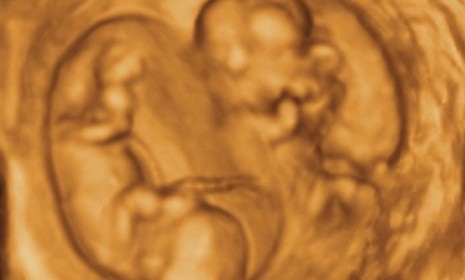Twin 'reduction': Is aborting one twin and not the other unethical?
A controversial procedure is adding a new twist to the already fractious debate in the abortion battle

A free daily email with the biggest news stories of the day – and the best features from TheWeek.com
You are now subscribed
Your newsletter sign-up was successful
In The New York Times Sunday Magazine, Ruth Padawer reports on the rise of a procedure known as "twin reduction," or the selective abortion of one of two fetuses. Advances in reproductive medicine and fertility treatments have created a strange paradox, Padawer explains: "In creating life where none seemed possible, doctors often generate more fetuses than they intend." In the mid-1980s, fertility doctors began terminating all but two or three fetuses when a woman under their care conceived quadruplets or quintuplets (or more), as a way to lower the health risks for both mother and babies. But, in recent years, women who are pregnant with twins and only want one baby are seeking out the procedure, too. Is choosing to abort one healthy fetus but not the other unethical?
No, this a valid, personal choice: "How is this different from a first trimester abortion?" asks Ceridwen Morris at Babble. As with abortion, twin reduction is a difficult, personal choice that women should be able to make for themselves. No one else should have a say in the matter; it's a women's right to decide if, and how, to continue a pregnancy.
"Thoughts on reducing a twin pregnancy to a single pregnancy"
The Week
Escape your echo chamber. Get the facts behind the news, plus analysis from multiple perspectives.

Sign up for The Week's Free Newsletters
From our morning news briefing to a weekly Good News Newsletter, get the best of The Week delivered directly to your inbox.
From our morning news briefing to a weekly Good News Newsletter, get the best of The Week delivered directly to your inbox.
Not under 'ObamaCare' it isn't: "As government takes over health care, controversial procedures such as selective reduction will need to be resolved not just by individual families, but also by the public at large who will be footing the bill," says Kelly Bartlett at RenewAmerica. Abortion, birth control, fertility treatments, and twin reduction all go against the natural order, and when taxpayers are paying for healthcare, they're no longer personal issues and choices. We'll all be paying for them eventually, and we have to ask if we can really afford to treat sex and reproduction this way.
"From Octomom to MomMinusOne, is sex in America too 'consumerish'?"
This raises some big questions: I'm torn here, says Frances Kissling in The Washington Post's On Faith blog. I want to respect both "the value of even early human life and the right of women and men to decide when and how to form families and to have — or not have — children." Ultimately, some practices that should be legal may not be ethical.
A free daily email with the biggest news stories of the day – and the best features from TheWeek.com
This exposes a contradiction in the pro-choice mindset: I find it strange that people are conflicted about twin reduction, says Jennifer Fulwiler at the National Catholic Register. It's really no different than having an abortion and the arguments for it are the same. Pro-choicers who find it troubling should do some soul searching, and ask themselves why this procedure bothers them while a standard abortion does not.
"What pro-choice intellectual honesty looks like"
-
 The problem with diagnosing profound autism
The problem with diagnosing profound autismThe Explainer Experts are reconsidering the idea of autism as a spectrum, which could impact diagnoses and policy making for the condition
-
 What are the best investments for beginners?
What are the best investments for beginners?The Explainer Stocks and ETFs and bonds, oh my
-
 What to know before filing your own taxes for the first time
What to know before filing your own taxes for the first timethe explainer Tackle this financial milestone with confidence
-
 The billionaires’ wealth tax: a catastrophe for California?
The billionaires’ wealth tax: a catastrophe for California?Talking Point Peter Thiel and Larry Page preparing to change state residency
-
 Bari Weiss’ ‘60 Minutes’ scandal is about more than one report
Bari Weiss’ ‘60 Minutes’ scandal is about more than one reportIN THE SPOTLIGHT By blocking an approved segment on a controversial prison holding US deportees in El Salvador, the editor-in-chief of CBS News has become the main story
-
 Has Zohran Mamdani shown the Democrats how to win again?
Has Zohran Mamdani shown the Democrats how to win again?Today’s Big Question New York City mayoral election touted as victory for left-wing populists but moderate centrist wins elsewhere present more complex path for Democratic Party
-
 Millions turn out for anti-Trump ‘No Kings’ rallies
Millions turn out for anti-Trump ‘No Kings’ ralliesSpeed Read An estimated 7 million people participated, 2 million more than at the first ‘No Kings’ protest in June
-
 Ghislaine Maxwell: angling for a Trump pardon
Ghislaine Maxwell: angling for a Trump pardonTalking Point Convicted sex trafficker's testimony could shed new light on president's links to Jeffrey Epstein
-
 The last words and final moments of 40 presidents
The last words and final moments of 40 presidentsThe Explainer Some are eloquent quotes worthy of the holders of the highest office in the nation, and others... aren't
-
 The JFK files: the truth at last?
The JFK files: the truth at last?In The Spotlight More than 64,000 previously classified documents relating the 1963 assassination of John F. Kennedy have been released by the Trump administration
-
 'Seriously, not literally': how should the world take Donald Trump?
'Seriously, not literally': how should the world take Donald Trump?Today's big question White House rhetoric and reality look likely to become increasingly blurred